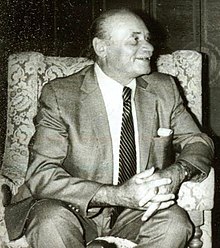Communist Party of Canada
| Communist Party of Canada Communist Party of Canada Parti communiste du Canada |
|
|---|---|
| founding | May 28, 1921 |
| Place of foundation | Guelph |
| Headquarters | Toronto |
| Youth organization | Young Communist League |
| newspaper | People's Voice and Clarté |
| Alignment |
Marxism-Leninism , Communism |
| International connections | International meeting of communist and workers' parties |
| Website | communist-party.ca |
The Communist Party of Canada ( English Communist Party of Canada , CPC ; French Parti communiste du Canada , PCC ) is a 1921 party in Canada . It takes a Marxist-Leninist point of view and is the second oldest still active party in the country after the Liberal Party of Canada . Once represented in several parliaments, the CPC now mainly focuses on extra-parliamentary activities.
Positions
The CPC opposes the prevailing opinion that the social model associated with the capitalist economy should be the end of human development. In her program she emphasizes that capitalism actually robs democratic institutions of their true character.
For Canada specifically, the CPC assesses the situation as such that Canada is on the one hand economically and politically completely dependent on the United States, since transnational US corporations control significant parts of the Canadian economy - supposedly to a greater extent than in any other developed in this way Country. According to the CPC, this results in problems for Canada with regard to pollution of the environment, financial cuts in education and health care, and poor social and cultural development in rural areas and agriculture itself.
Among other things, she calls for the introduction of the 32-hour week and a minimum wage of $ 20 as well as the nationalization of banks and key industries. In addition, the CPC is strongly committed to the rights of the First Nations and women's rights . In terms of foreign policy, a move away from the USA is advocated and an unreservedly pro-Palestinian stance is adopted in the Middle East conflict .
history
The Communist Party of Canada was founded in 1921 by radical activists of the labor movement as an initially illegal organization and shortly thereafter accepted into the Communist International . The party supported the Soviet Union unconditionally and initially relied primarily on the strike . In the late 1920s there was a rift between the Stalinists and the Trotskyists , whereupon the latter, including long-time party leader Maurice Spector , left the CPC.
The global economic crisis in the late 20s and early 30s changed the political system of Canada, in addition to the founding of several new parties, the Communist Party of Canada was able to gain influence and popularity (among other things, it was evident from the fivefold increase in the number of votes in the 1935 elections ). At the same time, however, many Canadian communists were politically persecuted, the general secretary Tim Buck , for example, was sentenced to two years of forced labor, and the party was finally forced into illegality in 1940. Although excluded from elections in this way, the CPC remained politically active through strikes and enjoyed increasing popularity among poorer sections of the population.
When the Second World War broke out , the communists initially protested violently against Canada's entry into the war, for which many CPC members were interned, while some fled to the USA . It was only after Hitler's attack on the Soviet Union that the attitude of the communists changed, who from then on viewed the Canadian war efforts as a contribution to the anti-fascist struggle.
In 1943 the Labor Progressive Party was founded as a legal replacement for the banned CPC. The union leader Fred Rose was able to move into the Canadian lower house as the first communist member of parliament in the 1945 general election . At that time, the party also held 13 other seats in regional parliaments. In the course of the approaching Cold War , however, several Canadian communists were suspected of espionage , which, in addition to Khrushchev's settlement with Stalin and the Soviet invasion of Hungary, led to a crisis in the party. In 1959 the "Labor-Progressive Party" renamed itself again to the "Communist Party of Canada".
After the end of the Cold War and the collapse of the Soviet Union, voices within the CPC increased calling for a distance from Marxism-Leninism and a move towards more social democratic positions. The reform-minded party chairman George Hewison was unable to assert himself against the strong Marxist-Leninist wing, whereupon the reformers left the party.
General Secretaries
| Surname | Term of office |
|---|---|
| Tom Burpee | 1921 |
| William Moriarty | 1921-1923 |
| Jack MacDonald | 1923-1929 |
| Tim Buck | 1929-1962 |
| Leslie Morris | 1962-1964 |
| William Kashtan | 1965-1988 |
| George Hewison | 1988-1992 |
| Miguel Figueroa | 1992-2016 |
| Elizabeth Rowley | since 2016 |
literature
- "History of the Communist Party of Canada 1921-1976". Dietz, Berlin 1984.
See also
Web links
Individual evidence
- ↑ Chapter 1 of the program of the party "Chapter 1: OUR AIM IS SOCIALISM" (Engl.)
- ↑ Chapter 2 of the program of the party "Chapter 2: CAPITALISM IN CANADA" (Engl.)
- ^ John Manley: "Audacity, audacity, still more audacity": Tim Buck, the Party, and the People, 1932-1939 ( Memento of July 30, 2003 in the Internet Archive )

